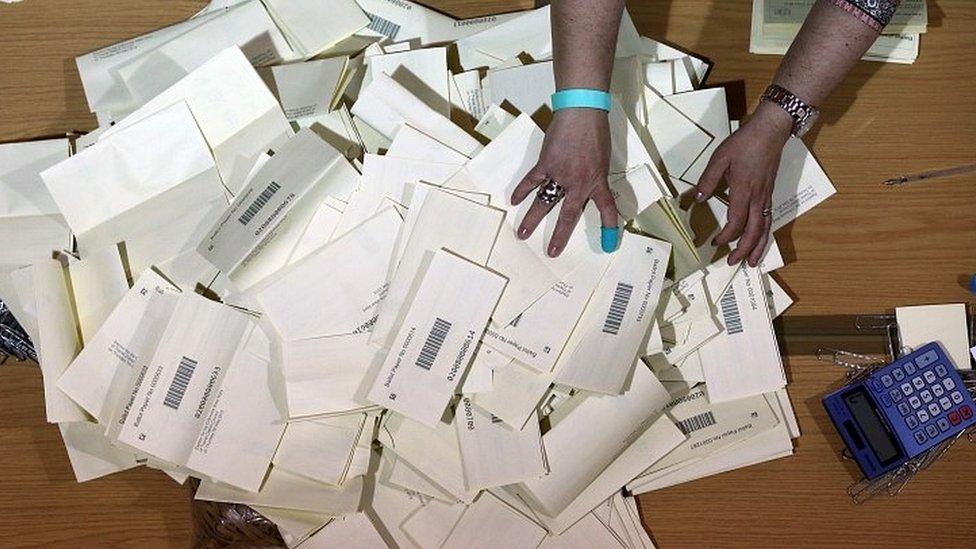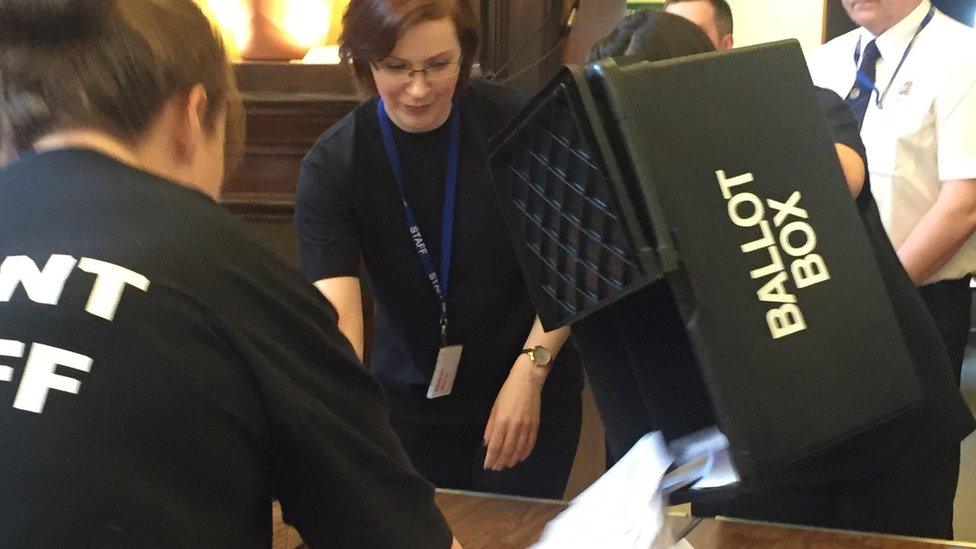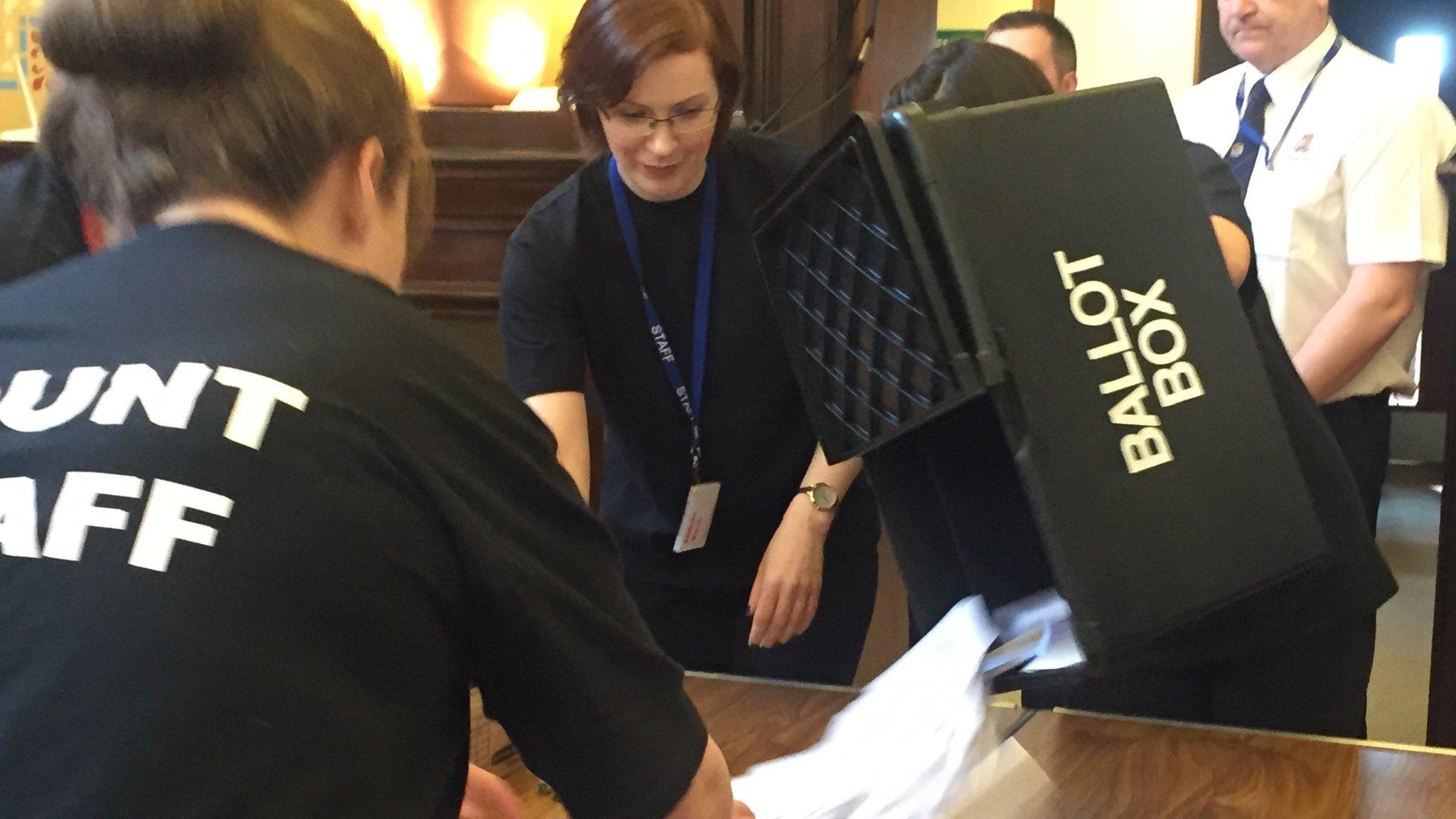Council elections on 3 May set to do nothing by halves
- Published

Counting on things not being done by halves
Spot the deliberate mistake
But you'll have to look closer to find it. So read on...
On Thursday 3 May 2018, elections in sixteen of our West Midlands local authority areas will present us with the biggest test of public opinion since last June's widely unexpected general election result. This alone guarantees there is much more riding on this year's contests than usual. Remember, though, these polls are not just some kind of national litmus paper exercise. We should never forget that they are significant in their own right, determining control of important authorities responsible for local services delivered to millions of us.
And there is an extra dash of spice this year too. For the first time in living memory, every single seat will be up for election in two of our local councils - one of them is by far our biggest and the other is among our most hotly-contested.
Let us begin with the first of those two.
Birmingham
All change at Europe's biggest local authority. In the wake of the Kerslake inquiry into its well-documented failings, the number of seats is being reduced from 120 to 101, with every single one of them up for election this time.
The new council will comprise a mixture of single-member and two-member wards. Labour had twice as many seats as the other parties put together in the outgoing council. This time, though, the Conservatives are hoping to make gains which might help to offset their expected losses in London. Their attack on Labour's record in office focuses on council tax rises and the lack of an early settlement to last summer's bins strike. Labour says it has given the bins service a sustainable future and made significant progress with the improvement strategy demanded by Kerslake. The Liberal Democrats major on the city's performance on refuse recycling. With the Commonwealth Games coming in 2022, the city centre is booming and property values in the wealthier suburbs are soaring. But nearby are five of the UK's top ten biggest concentrations of mass unemployment and deprivation. This is a city with a north-south divide of its own.
Cannock Chase
With one third of the seats up for election, the Conservatives will be hoping to make inroads into Labour's substantial majority: in the outgoing council, Labour held 21 seats and the Conservatives, 13. But the Tories have just three seats to defend this time compared with Labour's six. The two biggest parties will be battling for the support of those who have previously voted UKIP.
Cheltenham
Here it is! Already you have landed on that deliberate mistake. But why let the facts spoil a good headline?
Alone among our local authorities, Cheltenham is neither going "all out" nor voting in thirds. It is indeed doing things by half: 20 of its 40 seats are up for election. And that's not the only respect in which this famous Regency spa town is unique. It is also our region's only Liberal Democrat-controlled authority. It holds nearly three-quarters of the seats on the outgoing council. It is one of the places where the Lib Dems have been able to concentrate their support ever since the days of so-called 'pavement politics' 30 years ago. They need to start doing so again if they are to show evidence of a genuine recovery strategy, having suffered so many reverses since the end of the coalition government. With 14 seats to defend compared with the Conservatives' four, the Lib Dems appear to have much more to lose than to gain this time: Cheltenham returned a Conservative MP in both 2015 and 2017.

Fifteen West Midlands local authority areas are going to the polls
Coventry
Voting here is in the usual thirds in this classic two-party affair: all the councillors in the outgoing authority were either Labour or Conservative, with the former enjoying a majority of more than two to one over the latter. These elections are a precise reflection of this: Labour defend 12 seats and the Conservatives, six. Coventry's successful campaign for UK City of Culture 2021 has further boosted the re-emergence of a city so often associated with the fall and rise, and rise again, of the automotive industry. Labour will be confident of retaining its grip in a city where it holds all three parliamentary seats.
Dudley
If you are looking for the ultimate knife-edge contest, this is it. With six more seats than the Conservatives, Labour formed a minority administration after the last local elections when the eight UKIP members ruled out a deal with the Tories. Labour were just two seats short of overall control, having lost to the Conservatives in two marginal wards, by just three votes in the one and 13 in the other. This meant that if just nine people had voted Labour rather than Conservative, Labour would have had control of the council. Just one more seat would have given them effective control with the casting vote of the mayor. But then, last year, the Conservatives finally did a deal with UKIP, giving them overall control, albeit by the narrowest of margins. Much will depend this time on which of the bigger parties does best out of former UKIP supporters switching their allegiances. The Conservatives have seven seats to defend, Labour has 10, and the Liberal Democrats and UKIP both have two.
Newcastle-under-Lyme
Like Birmingham, Newcastle is holding an all-out election for fewer seats, down from 60 to 44. But unlike Birmingham, this is much more of a 'weather vane' town where the political wind direction remains unsettled. Although the Conservatives have two fewer seats than Labour, they formed a minority administration last November when the council's smaller party groupings switched their support from Labour. This followed a scathing report on last years's general election debacle when 1,500 voters, mostly Keele University students, were inadvertently excluded from polling. The Labour MP Paul Farrelly retained his seat with a majority of just 30. Though the council's direct responsibilities have precious little to do with Brexit, the question for Labour here is whether its moves towards a customs union and single market will prove damaging in an area which voted two-to-one to leave the EU. The Conservatives have 15 seats to defend, Labour has 23, and the Liberal Democrats and UKIP both have three.
Nuneaton and Bedworth
Nuneaton may have re-elected a Conservative MP to set David Cameron on course for his unexpected general election victory in 2015 but Labour holds sway on the local authority and will be confident of keeping it that way. In the outgoing council, it outnumbered the Conservatives by more than three to one. With half of the seats up for election, Labour has 14 seats to defend compared with the Conservatives' two and the Greens' one.
Redditch
With one-third of the seats to be contested, Labour will be hoping to strengthen its position in this see-saw town where its minority administration held just two more seats than the Conservatives in the outgoing council. Here again, the two biggest parties will be vying for the votes of people who previously supported UKIP, which has two seats to defend. Labour defends five seats and the Conservatives, three. Originally the home of the needle industry, Redditch is always susceptible to the ups and downs of the economy, thanks to its concentration of small and medium-sized engineering businesses, many of which supply the automotive sector.
Rugby
The Conservatives have a fight on their hands on a council where one-third of the seats are up for election. In the outgoing council, their minority administration had 22 seats, just two more than all the parties put together. This time, though, they have seven seats to defend, compared with Labour and the Liberal Democrats who have three each. Much will depend on whether or not the Lib Dems can retain or even improve on their previous showing.
Sandwell
In the run-up to this year's elections, the Labour-controlled authority voted unanimously for stronger powers to counter persistent allegations of corruption and sleaze. Of the 26 seats up for election, Labour held 23 three in the outgoing council. The remaining three were held by Independents.
Solihull
Birmingham's so-called 'Crown Jewels' including the airport and the National Exhibition Centre are not really in Birmingham at all, but in "leafy" Solihull. A rare Conservative bastion in the map of metropolitan England, with one-third of the seats up for election it looks set to remain so. But it is also a Green Party showpiece: they were the official opposition in the outgoing council, accounting for 10 of their 48 seats across our region as a whole. This time round, the Greens will be fielding more candidates across our region than UKIP.
Tamworth
One-third of the seats are being contested in the town made famous by Sir Robert Peel's "Tamworth Manifesto", widely seen as the blueprint for the modern Conservative party. They held 20 seats in the outgoing council, compared with Labour's seven and UKIP's three. These proportions are reflected in the seats up for election this time - the Conservative defend six and Labour, three.
Walsall
With one-third of the seats to be contested, Labour will be fighting hard to take control of an authority where it had a minority administration thanks to the the support of the two Liberal Democrats in the outgoing council. But when the numbers are as tight as they are here, the Conservatives are not without hope either. They had 25 seats in the outgoing council, just three short of Labour's tally, with three UKIP seats and the two Liberal Democrats. Here again, the bigger parties will be vying for the support of potential UKIP "switchers" in a town where the Tories captured Walsall North from Labour in last year's general election, apparently on the strength of local Brexit sentiment. This time, Labour has nine seats to defend, the Conservatives have seven and UKIP, three.
Wolverhampton
With the Wolves promotion to the Premier League to celebrate, the city has long been a Labour stronghold. In the outgoing council, Labour held 49 seats to the Conservatives' 10 and UKIP's one. With one-third of the seats up for election, there is little scope for significant change.
Worcester
The "Faithful City" witnessed high drama just a month before polling day when the smaller parties lost faith in Labour's minority administration and the Conservatives formed one of their own, with the Green Party holding the balance of power. With one-third of the seats up for election, the margins could hardly be closer in a council with a habit of see-sawing between the two biggest parties. The Conservatives and Labour both have six seats to defend. The Conservatives need just one gain for overall control while Labour needs two, albeit on a larger swing. The city which gave us "Worcester Woman" and witnessed New Labour's high water mark remains as fascinating as ever. The Conservatives have triumphed in every parliamentary election since 2010, but last year their majority over Labour was halved.
Wyre Forest
The days of "people power" when Independent Community and Health Concern controlled the council after the Kidderminster Hospital downgrading seem long gone. In the outgoing council, ICHC had just two seats compared with the Conservatives' 22, Labour's four and the Liberal Democrats' two. Wyre Forest has reverted to type as a Conservative stronghold and with one-third of the seats up for election this time, it looks set to remain so.
And another thing....
There is one further feature of this set of elections which makes them unique in yet another way.
They are the first since the Conservative "Metro Mayor" Andy Street was elected to preside over the West Midlands Combined Authority in the core West Midlands conurbation, comprising those seven giant metropolitan districts: Birmingham, Coventry, Dudley, Sandwell, Solihull, Walsall and Wolverhampton. The leaders of these authorities sit with Mr Street on the WMCA's leaders board, which recently embarrassed him by thwarting his initial proposal to charge a mayoral precept on top of council tax. Local Tories accused the five Labour members of the board of "playing politics".
Mr Street will be in no mood to stand aloof from the fray: just one more Tory leader alongside those of Solihull and Dudley would undoubtedly strengthen his position on the city region's top table.
- Published17 April 2018

- Published12 April 2018
